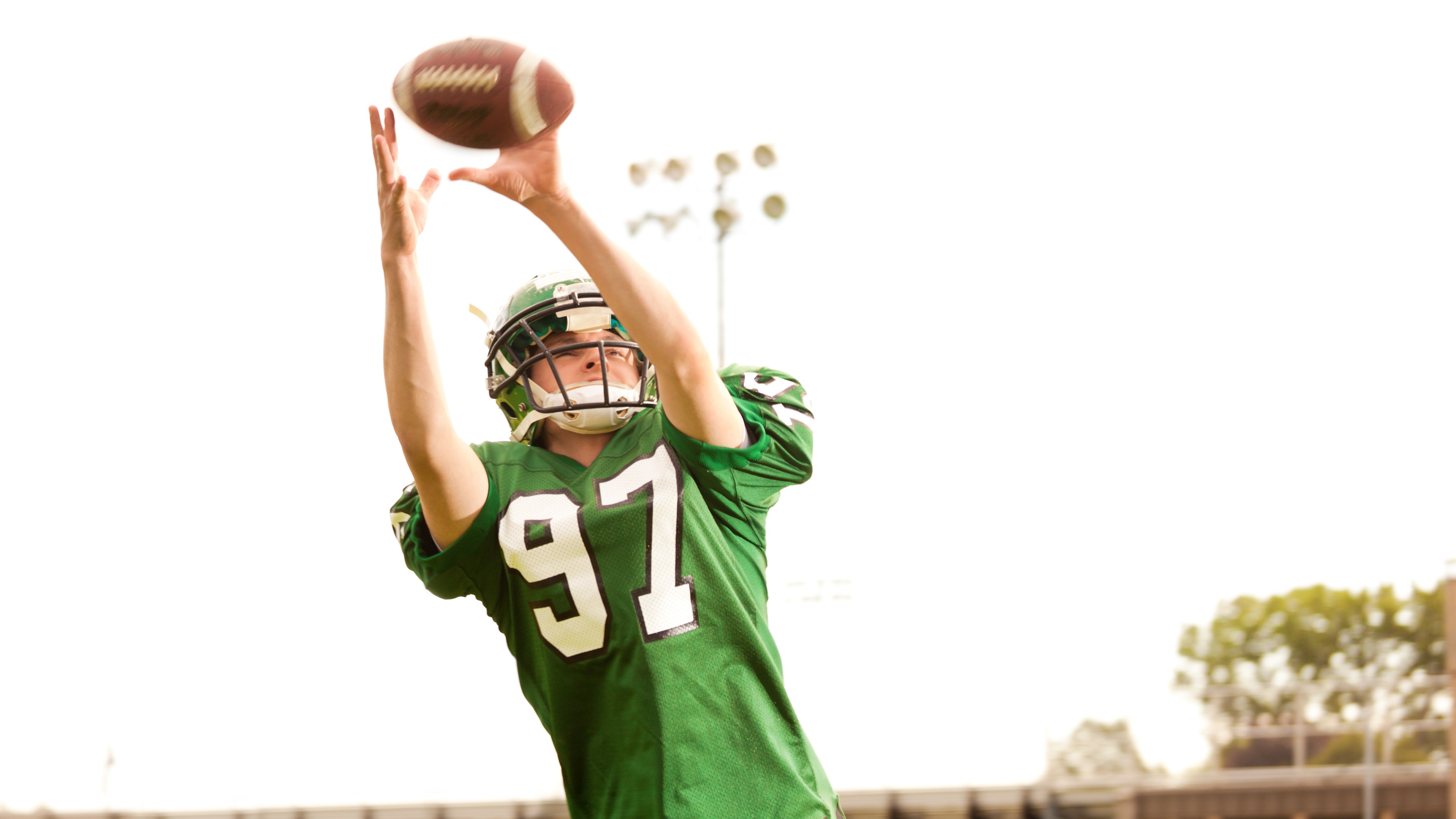What Student Athletes Need to Know About Their NIL Income
An athlete who receives name, image and likeness (NIL) income is considered self-employed, which means they need to keep taxes and other issues in mind.

Profit and prosper with the best of Kiplinger's advice on investing, taxes, retirement, personal finance and much more. Delivered daily. Enter your email in the box and click Sign Me Up.
You are now subscribed
Your newsletter sign-up was successful
Want to add more newsletters?

Delivered daily
Kiplinger Today
Profit and prosper with the best of Kiplinger's advice on investing, taxes, retirement, personal finance and much more delivered daily. Smart money moves start here.

Sent five days a week
Kiplinger A Step Ahead
Get practical help to make better financial decisions in your everyday life, from spending to savings on top deals.

Delivered daily
Kiplinger Closing Bell
Get today's biggest financial and investing headlines delivered to your inbox every day the U.S. stock market is open.

Sent twice a week
Kiplinger Adviser Intel
Financial pros across the country share best practices and fresh tactics to preserve and grow your wealth.

Delivered weekly
Kiplinger Tax Tips
Trim your federal and state tax bills with practical tax-planning and tax-cutting strategies.

Sent twice a week
Kiplinger Retirement Tips
Your twice-a-week guide to planning and enjoying a financially secure and richly rewarding retirement

Sent bimonthly.
Kiplinger Adviser Angle
Insights for advisers, wealth managers and other financial professionals.

Sent twice a week
Kiplinger Investing Weekly
Your twice-a-week roundup of promising stocks, funds, companies and industries you should consider, ones you should avoid, and why.

Sent weekly for six weeks
Kiplinger Invest for Retirement
Your step-by-step six-part series on how to invest for retirement, from devising a successful strategy to exactly which investments to choose.
While professional sports can be extremely lucrative, student athletes can also clear quite a bit of income before they turn pro. In 2021, the NCAA established interim guidelines allowing student athletes to capitalize on income opportunities related to their name, image and likeness (NIL). Since then, quite a few student athletes are earning NIL income of more than $1 million per year. Talk about enterprising!
Indeed, that word, “enterprising,” is key for student athletes who obtain money from NIL opportunities, because it is taxed as self-employment income. Managing — and maximizing — the NIL income student athletes are allowed to earn, especially from a tax perspective, can feel daunting.
What NIL income encompasses
The NCAA’s guidelines allow student athletes in all sports to earn NIL income through a variety of opportunities, including autograph signings, speaking engagements and hosting sports camps and training clinics.
From just $107.88 $24.99 for Kiplinger Personal Finance
Become a smarter, better informed investor. Subscribe from just $107.88 $24.99, plus get up to 4 Special Issues

Sign up for Kiplinger’s Free Newsletters
Profit and prosper with the best of expert advice on investing, taxes, retirement, personal finance and more - straight to your e-mail.
Profit and prosper with the best of expert advice - straight to your e-mail.
Like their professional counterparts, student athletes may earn compensation from commercial endorsement deals with brands and companies, licensing deals and social media partnerships. They can monetize their personal brands on platforms like Instagram and TikTok, create sponsored content and charge for subscriptions to online content they create.
The NCAA guidelines also enable student athletes to forge deals with local businesses for appearances, endorsements, joint marketing initiatives or promotions.
Of course, the NCAA’s rules regarding pay-to-play and impermissible inducements for recruitment still apply to student athletes taking advantage of NIL opportunities, as do NIL rules at individual schools and in different states and conferences.
And, just like all income, NIL money is subject to one of two certainties in life — taxes.
Navigating ‘the jock tax,’ self-employment taxes and more
Opportunities to capitalize on NIL can bring student athletes more income, but more income brings more taxes.
When you travel to another state, you need to file a non-resident tax return for income you earn while in that state. This rule is often referred to as “the jock tax” because college athletes usually have to travel to different states where they don’t live to compete. Any autograph signings or other personal appearances — anything that accrues NIL income for them while they are in other states for competition — is subject to taxes.
Money that is earned from NIL ventures is considered self-employment income by the tax man. If a student athlete receives more than $600 in NIL income from any single source, they should receive Form 1099-NEC from the payor of that income, or if they receive the payment via apps like Venmo or Zelle, they will receive Form 1099-K. The income shown on these forms is reported to the IRS and must be reported on the athlete’s tax return.
It is up to student athletes to keep track of all the documentation related to their NIL income and expenses, which they will need when they fill out their Schedule C tax form for business operators and sole proprietors when filing their taxes. On top of federal and possible state income tax, NIL income, like all self-employment income, is taxed at a rate of 15.3% (consisting of 12.4% for Social Security and 2.9% for Medicare) — just like if the student athlete was earning a paycheck from an employer.
Additionally, anything student athletes receive in the course of competing in games and earning NIL money — food, clothing, discounts, etc. — can be counted as income. All of these tokens have to be reported as income, at the value they are worth when athletes receive them.
Further tips for student athletes managing NIL income include:
- Be mindful of financial aid. Income from NIL opportunities must be included in taxable income reported by students on their Free Application for Federal Student Aid (FAFSA) application forms. If a student athlete’s taxable income is considered high, they could receive less aid than they request.
- Keep track of potential deductions. Self-employed individuals can deduct expenses related to their work. Costs for travel, meals, hotel stays, agency fees and more could be deducted against taxes on NIL income.
- Pay estimated taxes. Since taxes are generally not withheld from NIL income, and student athletes are considered self-employed, they should consider paying quarterly federal and state estimated taxes. Allocating money from NIL income for estimated tax payments can help athletes avoid potential penalties.
- Income from collectives is always taxable. Collectives established by athletic program boosters and fans at some universities to pool donor-driven revenue can help student athletes obtain NIL deals. Some of these collectives have tax-exempt 501(c)(3) nonprofit status from the IRS, though the agency has revoked the status from certain collectives. Student athletes need to be aware that, regardless of whether a collective has tax-exempt status, the NIL income they earn via collectives is still taxable and must be reported.
- Maintain separate bank accounts and credit cards for NIL purposes. Student athletes can keep track of NIL income and related expenses by keeping separate bank savings and checking accounts, and credit cards, for these opportunities.
Working with a trusted financial adviser can help student athletes utilize the same skills that make them successful on the playing field to create plans for saving and optimizing NIL income to meet long- and short-term financial goals. In addition to crafting budgets for meeting short-term expenses, advisers can also help student athletes record documentation and manage payments for taxes and demonstrate how certain saving and investing strategies can maximize NIL income to open a business or make other dreams a reality when an athlete’s playing career is over.
Student athletes understand the importance of planning, teamwork and coaching for winning on the court and on the field. The same tactics apply to managing income from NIL opportunities and making that income work for athletes during and after their playing careers.
Charles R. Johnson and Richard Pianoforte, CFP, are Wealth Director and Managing Director of Tax, respectively, at Fiduciary Trust International.
Related Content
- Chasing Athletic Scholarship Dreams Can Be a Costly Mistake
- Tax Implications When NCAA Student Athletes Make Money
- Big Money Is Chasing Sports Collectibles: Investing Opportunity or Market Top?
- Pro Athletes Must Carefully Vet Financial Advice or Risk Losing It All
Profit and prosper with the best of Kiplinger's advice on investing, taxes, retirement, personal finance and much more. Delivered daily. Enter your email in the box and click Sign Me Up.

Charles R. Johnson, Wealth Director at Fiduciary Trust International, is responsible for developing investment and trust relationships with families and organizations. He works closely with the Trust and Tax planning group to help clients determine optimal asset allocation and transfer strategies. Before joining Fiduciary Trust International, he worked for Rockefeller Capital Management, an independent financial services firm offering global family office, asset management and strategic advisory services to ultra-high-net-worth families, institutions and corporations.
-
 Quiz: Do You Know How to Avoid the "Medigap Trap?"
Quiz: Do You Know How to Avoid the "Medigap Trap?"Quiz Test your basic knowledge of the "Medigap Trap" in our quick quiz.
-
 5 Top Tax-Efficient Mutual Funds for Smarter Investing
5 Top Tax-Efficient Mutual Funds for Smarter InvestingMutual funds are many things, but "tax-friendly" usually isn't one of them. These are the exceptions.
-
 AI Sparks Existential Crisis for Software Stocks
AI Sparks Existential Crisis for Software StocksThe Kiplinger Letter Fears that SaaS subscription software could be rendered obsolete by artificial intelligence make investors jittery.
-
 Social Security Break-Even Math Is Helpful, But Don't Let It Dictate When You'll File
Social Security Break-Even Math Is Helpful, But Don't Let It Dictate When You'll FileYour Social Security break-even age tells you how long you'd need to live for delaying to pay off, but shouldn't be the sole basis for deciding when to claim.
-
 I'm an Opportunity Zone Pro: This Is How to Deliver Roth-Like Tax-Free Growth (Without Contribution Limits)
I'm an Opportunity Zone Pro: This Is How to Deliver Roth-Like Tax-Free Growth (Without Contribution Limits)Investors who combine Roth IRAs, the gold standard of tax-free savings, with qualified opportunity funds could enjoy decades of tax-free growth.
-
 One of the Most Powerful Wealth-Building Moves a Woman Can Make: A Midcareer Pivot
One of the Most Powerful Wealth-Building Moves a Woman Can Make: A Midcareer PivotIf it feels like you can't sustain what you're doing for the next 20 years, it's time for an honest look at what's draining you and what energizes you.
-
 I'm a Wealth Adviser Obsessed With Mahjong: Here Are 8 Ways It Can Teach Us How to Manage Our Money
I'm a Wealth Adviser Obsessed With Mahjong: Here Are 8 Ways It Can Teach Us How to Manage Our MoneyThis increasingly popular Chinese game can teach us not only how to help manage our money but also how important it is to connect with other people.
-
 Looking for a Financial Book That Won't Put Your Young Adult to Sleep? This One Makes 'Cents'
Looking for a Financial Book That Won't Put Your Young Adult to Sleep? This One Makes 'Cents'"Wealth Your Way" by Cosmo DeStefano offers a highly accessible guide for young adults and their parents on building wealth through simple, consistent habits.
-
 Global Uncertainty Has Investors Running Scared: This Is How Advisers Can Reassure Them
Global Uncertainty Has Investors Running Scared: This Is How Advisers Can Reassure ThemHow can advisers reassure clients nervous about their plans in an increasingly complex and rapidly changing world? This conversational framework provides the key.
-
 I'm a Real Estate Investing Pro: This Is How to Use 1031 Exchanges to Scale Up Your Real Estate Empire
I'm a Real Estate Investing Pro: This Is How to Use 1031 Exchanges to Scale Up Your Real Estate EmpireSmall rental properties can be excellent investments, but you can use 1031 exchanges to transition to commercial real estate for bigger wealth-building.
-
 The 8 Stages of Retirement: An Expert Guide to Confidence, Flexibility and Fulfillment, From a Financial Planner
The 8 Stages of Retirement: An Expert Guide to Confidence, Flexibility and Fulfillment, From a Financial PlannerRetirement planning is less about hitting a "magic number" and more about an intentional journey — from understanding your relationship with money to preparing for your final legacy.

